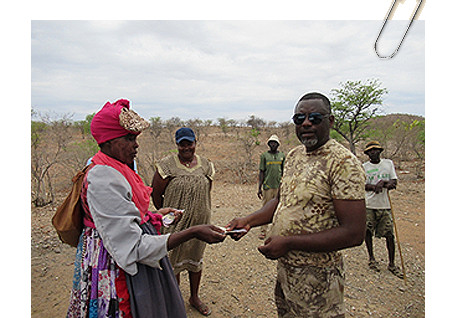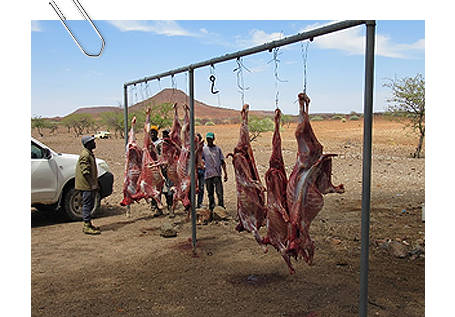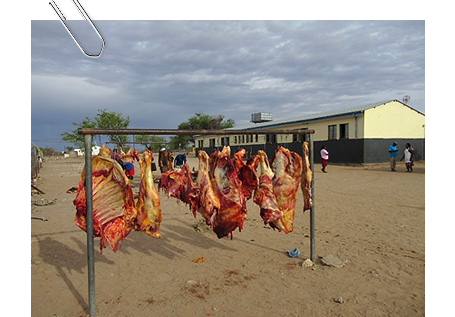IRDNC joins national drought relief efforts
Since the early 1980s, IRDNC’s purpose has been to link conservation to the social and economic development of the people who live with wildlife and other valuable natural resources. With permanent field teams in the Kunene and Zambezi Regions, IRDNC observed the distressing effect of drought hitting communal conservancies and rural farmers in both regions with great concern. Plunging wildlife numbers, migration and illegal settlement of cattle farmers in search of better grazing, dying livestock and the eventual outcries of food deficiencies had IRDNC calling an emergency workshop in Windhoek, convening government officials, development agencies, local corporate firms, and other non-governmental organisations to brainstorm urgent solutions to the devastating drought crisis.
The workshop successfully led to raising of a N$ 480,065 contribution from DEBMARINE and NAMDEB Foundation, Ongava Game Reserve and Natural Selection for a Cash for Meat Carcass initiative in Kunene Region. Planning and preparations immediately began; liaising with the Directorate of Veterinary Services, the Namibian Police, Ministry of Agriculture, Regional Councillors Offices and the Directorate of Disaster Risk Management of the Office of the Prime Minister. Conservancies and conservancy associations were pleased to broadcast the good news that Kunene farmers can bring forward cattle carcasses for cash. Torra Conservancy brought ten carcasses from two farmers, while ǂKhoadi //Hôas and Anabeb Conservancies sold 22 and 117 from 10 and 11 farmers respectively. Ozondundu Conservancy sold 55 carcasses and Sesfontein Conservancy sold 70, totalling to 274 carcasses so far.
The field team led by IRDNC’s Cluster Coordinator, Dave Kangombe, toured Kunene conservancies buying cattle carcases and distributing meat to the elderly and vulnerable members of the conservancies, as well as to local schools. This ingeniously relieved farmers with cattle unlikely to survive beyond the drought crisis and simultaneously provided food to starving rural communities. Some farmers made use of the cash income to buy fodder for their remaining herds, in the hope that their best breeds will endure to restock their kraals in the future. The field team proceeded northwards in the Kunene to include conservancies such as Puros, Otjikondowarongo and more.
Earlier on in the year, IRDNC and the Namibia Chamber of Environment (NCE) also signed an agreement to implement a cash-for-work projects in Kunene, with a total budget of N$2,715,042 to employ close to 300 people on short-term projects during the drought period. Work includes: 1) Clearing roads for annual game counts in conservancies, 2) Opening access to new tourism infrastructure (hiking trails, campsites, etc.) in currently underdeveloped conservancies; and; 3) Cleaning waste sites and litter collection at selected villages. Equal numbers of men and women were offered employment at N$ 100 per day per person, N$ 40 of which given in the form of food parcels.
IRDNC extends a huge appreciation to all the donor organisations, planning partners and stakeholders, and especially to B2Gold Managing Director – Mark Dawe – who helped immensely with fundraising efforts, IRDNC’s Executive Director,John Kasaona, who led the initiative, as well as the Natural Resources Working Group at NACSO and IRDNC Kunene Office staff volunteering their time to the cause.

- Cash for cattle carcass being handed over to the beneficiaries

- Cattle carcasses that were bought in Torra Conservancy

- Meat being distributed to Groot-Berg Primary School in #Khoadi //Hoas Conservancy



